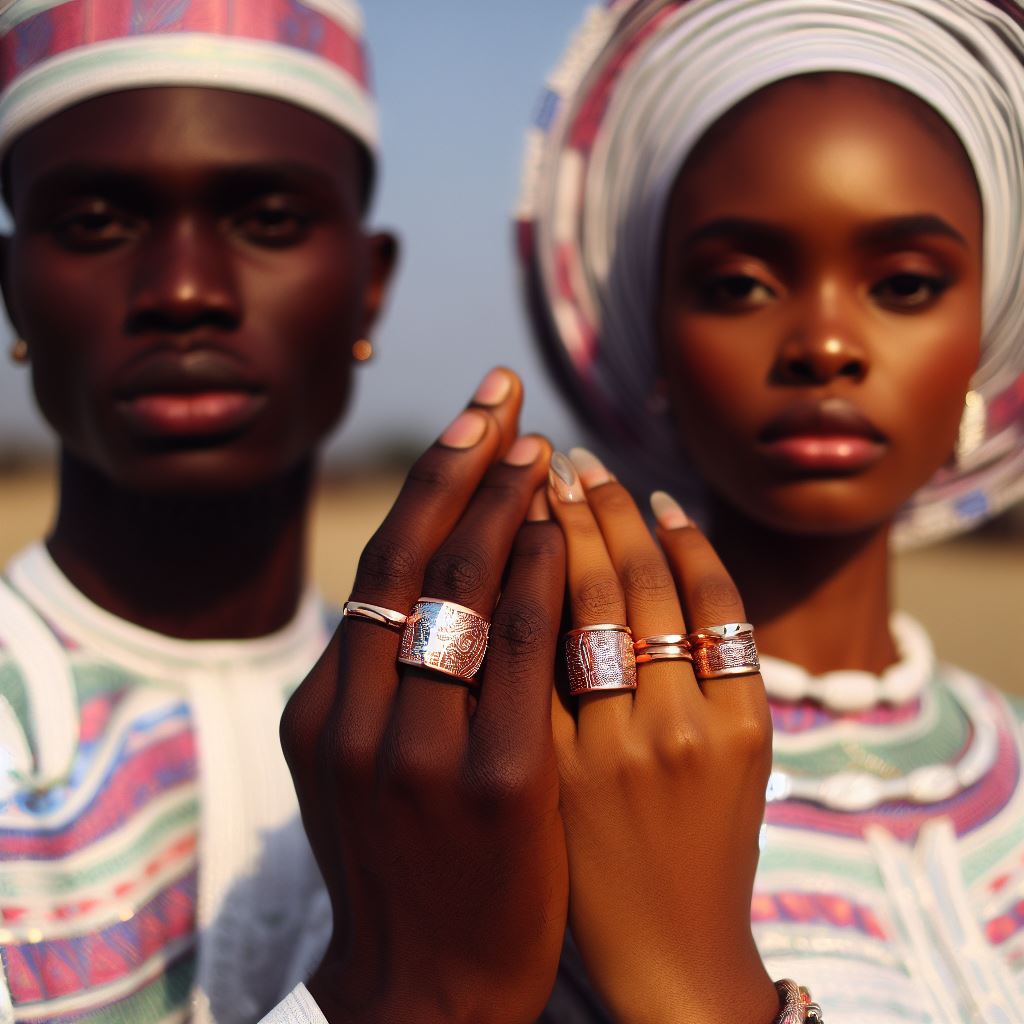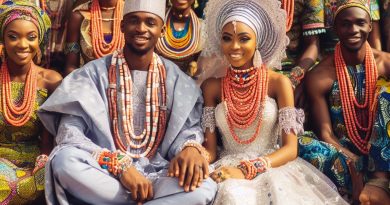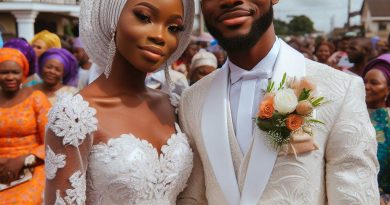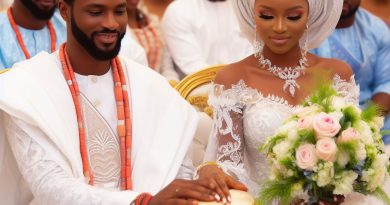The Symbolism Behind Nigerian Marriage Rings Explained
Last Updated on January 28, 2024
Introduction
Nigerian marriage rings hold great cultural importance, serving as significant symbols within Nigerian society.
In this blog post, we will explore the deep symbolism behind these rings and understand their meaning in Nigerian weddings.
Marriage rings play a crucial role in Nigerian culture, representing love, commitment, and unity between couples.
These rings are exchanged during traditional wedding ceremonies as a gesture of lifelong dedication.
The purpose of this blog post is to delve into the symbolism embedded in Nigerian marriage rings, allowing us to appreciate the profound cultural significance they hold.
By understanding the meanings behind these rings, we can gain insight into the depth of Nigerian traditions and customs.
Nigerian marriage rings encapsulate the essence of love and unity, serving as tangible symbols of everlasting commitment.
These rings are often crafted with intricate designs, reflecting the rich cultural heritage of Nigeria.
Marriage rings also symbolize the enduring bond between spouses, reminding couples of their lifelong promise to support and cherish each other.
They act as tangible reminders of the sacred vows taken during the wedding ceremony.
Moreover, these rings serve as public declarations of love and commitment, signifying the couple’s status as a united front.
They display the deep bond shared between husband and wife, symbolizing their devotion and loyalty.
In Nigerian culture, the exchange of marriage rings is a cherished tradition that holds immense cultural and emotional significance.
It represents the beginning of a new chapter in the couple’s life, filled with love, unity, and everlasting commitment.
Through the exploration of the symbolisms behind Nigerian marriage rings, this blog post aims to shed light on the beauty and meaning contained within these precious symbols of love.
Join us on this journey to discover the profound cultural values attached to Nigerian marriage rings.
Historical Background of Nigerian Marriage Rings
When it comes to Nigerian marriage traditions, the exchange of rings has always been a significant part of the ceremony.
Let’s delve into the history of marriage rings in Nigeria and explore the traditional materials used for crafting these symbolic pieces.
A. History of Marriage Rings in Nigeria
Marriage rings in Nigeria have a rich history that dates back centuries.
The tradition of exchanging rings can be traced to ancient Nigerian civilizations, such as the Nri Kingdom and the Benin Empire.
These rings were symbols of love, commitment, and unity.
B. Traditional Materials Used for Making Marriage Rings
- Gold: Gold has been a popular material for crafting Nigerian marriage rings, symbolizing wealth, prosperity, and durability. In ancient times, gold rings denoted a higher social status.
- Coral: Coral is another important material used in Nigerian marriage rings. It holds cultural significance and represents fertility, protection, and good luck. Coral also carries spiritual connotations in Nigerian traditions.
- Beads: Colorful beads are an integral part of Nigerian culture, and they are often incorporated into marriage rings.
Beads symbolize beauty, tradition, and unity between the couple and their families. - Ivory: Ivory, derived from elephant tusks, is a material that was historically used for crafting Nigerian marriage rings. It symbolizes strength, wisdom, and purity.
- Bronze: Bronze is a traditional material used in Nigerian art and craftsmanship, including marriage rings. It represents cultural heritage, craftsmanship, and durability.
C. Importance of Traditional Materials in Nigerian Culture
- Connection to Ancestral Roots: Using traditional materials in marriage rings reflects a connection to Nigerian cultural heritage and ancestral roots. It honors the customs and traditions passed down through generations.
- Symbolism and Significance: Each material used in Nigerian marriage rings carries its own symbolism and meaning.
Incorporating these materials into the rings adds depth and significance to the marital union, amplifying its cultural value. - Preservation of Cultural Identity: By using traditional materials, Nigerian couples honor and preserve their cultural identity, ensuring that the essence of their traditions remains alive.
- Spiritual Beliefs: Traditional materials, such as coral and ivory, hold spiritual significance in Nigerian beliefs.
Wearing marriage rings made from these materials is believed to bring blessings, protection, and harmony to the couple’s union. - Craftsmanship and Artistry: The use of traditional materials showcases the exquisite craftsmanship and artistry of Nigerian artisans.
Each ring becomes a masterpiece, combining cultural heritage with skilled workmanship.
In fact, Nigerian marriage rings have a fascinating historical background, deeply rooted in the country’s rich cultural traditions.
The traditional materials used, such as gold, coral, beads, ivory, and bronze, carry symbolic meanings and reflect the importance of ancestral heritage.
The incorporation of these materials in marriage rings not only adds beauty but also preserves and celebrates Nigerian culture.
Read: Setting and Achieving Goals as a Married Couple in Nigeria
Symbolism of Nigerian Marriage Rings
A. The Circular Shape
Nigerian marriage rings are circles, symbolizing eternity, an unbroken union, and love without end.
This shape represents the unending nature of the bond between husband and wife.
The circle signifies the perpetuity of commitment, without a beginning or an end.
B. The Material Matters
Traditionally, rings were made of various materials, each carrying unique symbolism:
- Gold: A symbol of wealth, prosperity, and the enduring value of the marriage.
- Silver: Signifying purity, serenity, and the hope for a harmonious marriage.
- Bronze: Embracing Nigerian heritage, connecting the couple to their cultural roots.
- Gemstones: Embedded gemstones can represent various qualities; for instance, diamonds signify strength and everlasting love.
C. Design and Adornments
1. Engravings
Many Nigerian rings are adorned with intricate engravings, often including the couple’s names, wedding date, or meaningful verses.
These engravings serve as a reminder of the couple’s commitment and love.
2. Beadwork
In some Nigerian cultures, rings are adorned with colorful beads.
Beads are not only aesthetically pleasing but also represent unity, fertility, and love.
3. Geometric Patterns
Geometric patterns in ring designs hold symbolic importance:
- Triangles: Representing the Holy Trinity in Christian marriages.
- Spirals: Signifying the cycles of life and growth.
- Interlocking Rings: Symbolizing the union of two lives.
4. Unique Cultural Elements
Different Nigerian ethnic groups infuse their rings with unique cultural elements:
- Yoruba rings might feature cowrie shells, symbolizing prosperity.
- Igbo rings often incorporate the ichi marks or nsibidi symbols, representing cultural identity.
- Hausa rings could include Arabic inscriptions, emphasizing faith.
Nigerian marriage rings are not just ornamental; they tell a profound story of love, culture, and commitment.
The circular shape, materials used, and intricate designs are all rich in symbolism, reminding couples of the enduring nature of their union and their deep cultural roots.
Read: The Journey from Wedding Day to Years of Unity in Nigeria

You Might Also Like: Hausa Wisdom: Traditions and Quotes on Marriage
Influence of Nigerian Culture on Marriage Ring Symbolism
A. How Nigerian culture and traditions affect the symbolism of marriage rings
- Nigerian culture places great importance on marriage and sees it as a sacred institution.
- Marriage rings are symbolic of the unity and commitment between spouses in Nigerian culture.
- The rings are considered a visual representation of the love and bond shared between the couple.
- Nigerian culture values the concept of family, and marriage rings serve as a reminder of this bond.
B. The impact of ethnic diversity on marriage ring symbolism
- Nigeria is a culturally diverse country with over 250 ethnic groups, each having its unique traditions.
- The diversity in Nigeria leads to various interpretations and symbolism attached to marriage rings.
- Different ethnic groups may have specific designs or materials used for their marriage rings.
- The symbolism associated with marriage rings can vary depending on the ethnic background of the couple.
C. Specific cultural beliefs or rituals related to Nigerian marriage rings
- In Yoruba culture, the groom presents the bride with an engagement ring during the traditional introduction ceremony.
- The engagement ring signifies his intention to marry her and is worn on the right hand.
- During the wedding ceremony, the bride and groom exchange wedding rings as a symbol of their commitment.
- The rings are usually engraved with personal symbols or phrases that hold significant meaning for the couple.
D. Importance of ancestral heritage in marriage ring symbolism
- Nigerian culture values ancestral heritage and often incorporates it into marriage ring symbolism.
- Some couples choose to have their marriage rings crafted using traditional Nigerian symbols or motifs.
- These symbols can represent qualities such as fertility, protection, or strength, passed down from ancestors.
- Wearing these symbolic rings connects the couple to their heritage and ancestral blessings.
E. Evolving trends in Nigerian marriage ring symbolism
- While traditional symbolism still holds significance, modern Nigerian couples are embracing personalization.
- Couples now incorporate their individual preferences, such as gemstones or personalized engravings, into their rings.
- Modernization and globalization have influenced the designs and materials used for marriage rings in Nigeria.
- The evolving trends reflect a blend of traditional symbolism and contemporary aesthetics.
Essentially, Nigerian culture and traditions heavily influence the symbolism associated with marriage rings.
The ethnic diversity within the country adds further depth and variation to these symbols.
Specific cultural beliefs and rituals related to marriage rings highlight the importance placed on unity and commitment.
Additionally, ancestral heritage and evolving trends play a role in the symbolism attached to these rings.
Overall, Nigerian marriage rings serve as powerful representations of love, commitment, and cultural heritage.
Read: Understanding the Deep Meaning of Marriage Messages
Gain More Insights: How Religion Shapes Marital Conflicts in Nigeria
Delve into the Subject: Strengthening the Marital Bond: A Nightly Prayer Routine
Contemporary Trends and Variations in Nigerian Marriage Rings
A. Impact of modernization and globalization
Modernization and globalization have revolutionized the symbolism of Nigerian marriage rings.
Traditional aspects remain, but new meanings have emerged.
- Increased exposure to different cultures has influenced the choice of materials and design.
- Symbolism has expanded beyond traditional markers of commitment to include personalization and individuality.
- The rise of online marketplaces has provided access to a wider range of designs, materials, and styles.
- Global trends, such as minimalist designs or vintage-inspired rings, have influenced Nigerian ring designs.
B. Influence of Western culture
We cannot underestimate Western culture’s influence on Nigerian marriage ring designs. It has significantly impacted their styles and aesthetics.
- Western-style engagement rings with diamonds or gemstones have gained popularity in Nigeria.
- Western symbolism, such as the concept of eternity rings, has been incorporated into Nigerian designs.
- Western notions of love, romance, and commitment have influenced the meaning attached to Nigerian marriage rings.
- Western media, including movies and celebrities, have shaped Nigerian perceptions of what a marriage ring should look like.
C. Variations in marriage ring designs across regions or tribes
Nigeria’s diverse ethnic groups and regions have distinct variations in marriage ring designs, reflecting their unique traditions and customs.
- In the northern region, Islamic designs featuring Arabic calligraphy or geometric patterns are prevalent.
- Yoruba culture in the southwest emphasizes intricate gold or silver filigree work in their marriage rings.
- Igbo marriage rings often feature coral beads, which are considered auspicious and symbolize fertility.
- The Niger Delta region incorporates traditional symbols and motifs, such as the famous “Ekpe” or leopard design.
These regional variations highlight the rich cultural heritage and diversity of Nigeria.
Contemporary Nigerian marriage rings showcase a fusion of tradition, modernization, and global influences.
They embody personal beliefs, cultural values, and aspirations while reflecting the changing dynamics of Nigerian society.
As Nigeria continues to evolve, so too will the symbolism and designs of its marriage rings, reflecting the ongoing influence of modernization and globalization.
Read: Traditional Nigerian Wedding Messages and Meanings
Find Out More: How to Authenticate Your Nigerian Marriage Certificate Abroad
Conclusion
Nigerian marriage rings hold significant meaning and symbolism in the country’s culture.
They serve as a visual representation of love, commitment, and unity between couples.
The designs and materials used vary, each carrying its own unique message.
Understanding the symbolism behind Nigerian marriage rings is essential as it gives insight into the rich cultural heritage of the country.
It allows us to appreciate and respect the customs and traditions associated with marriage and commitment.
We encourage readers to embrace diversity and value the cultural significance of marriage rings in Nigeria.
By doing so, we can foster a deeper appreciation for the traditions of different cultures, promoting inclusivity and understanding.
So, next time you spot a Nigerian marriage ring, remember the depth of symbolism and love it represents.


